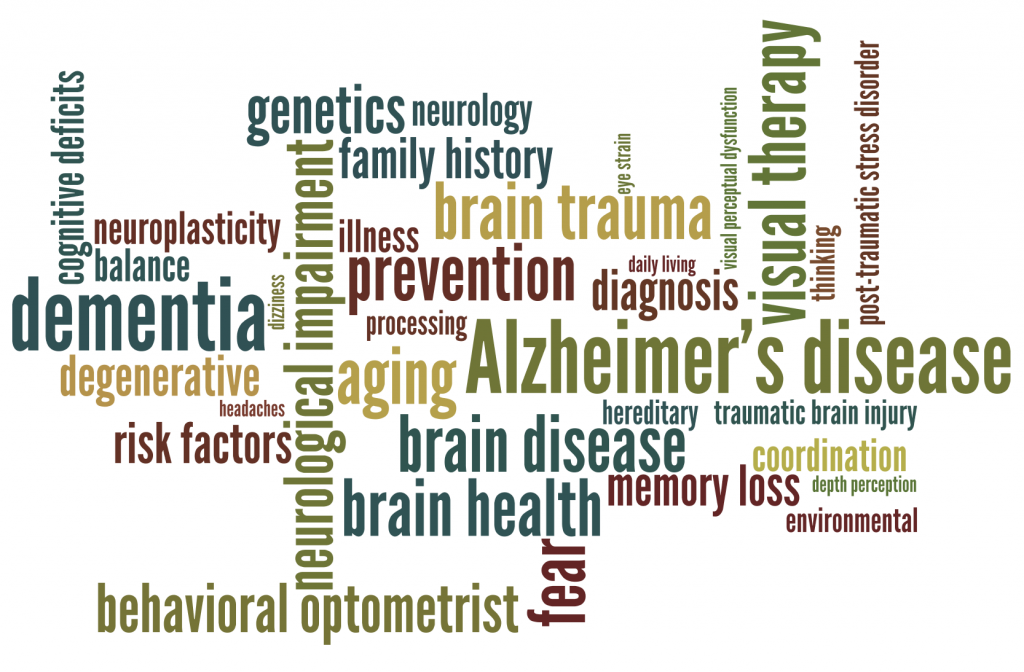Alzheimer’s and You: Facing Our Fear
We all feel like we’re losing our minds once in a while, and while we may joke about being a few cards short of a deck, the reality is that most of us have a deep fear of developing dementia or Alzheimer’s disease. In fact, a new survey notes that:
“Americans fear developing Alzheimer’s disease more than any other major life-threatening disease, including cancer, stroke, heart disease and diabetes.”
There are several risk factors for developing dementia or Alzheimer’s, such as
- Age
- Family history of disease (could be hereditary, environmental, or both)
- Genetics
- Brain Trauma
While we cannot stop getting older, change our family gene pool, or erase a significant brain trauma, we can make use of therapies and programs that can help us battle against the possible onslaught of dementia and Alzheimer’s.
PTSD, TBI, and YOU!
If you have been through a traumatic or life-threatening event, your body may have responded by developing post-traumatic stress disorder (PTSD). PTSD seems to be a factor that increases your risk of developing dementia. Or perhaps you’ve suffered through a fall, collision, sports injury, or other event that led to a traumatic brain injury (TBI). Research indicates that moderate, severe, or repeated mild traumatic brain injuries may also increase the risk of dementia and alzheimer’s.
PTSD and TBI both cause changes in the brain that are detrimental to optimal functioning . When the brain is injured, all areas of life can be impacted, from vision to memory, reasoning to problem-solving, perceptual abilities to information processing.
If you have a family history of dementia or Alzheimer’s, are advancing in age, or have suffered with PTSD or a TBI, you are faced with a history that could impact your future. Visual deficits make up a significant piece of this puzzle. Visual perceptual dysfunction is one of the most common symptoms, and it can have a devastating impact on your daily life since most activities require optimal visual efficiency and visual processing.
Take action if you notice:
- Double vision
- Blurred vision
- Inability to focus on visual tasks
- Dizziness
- Headaches
- Eye strain
- Difficulty reading (such as loss of place or poor comprehension)
- Closing or covering one eye
- Balance and coordination problems
- Poor judgment of depth
One crucial step you can take to strengthen your visual perceptual skills is to seek therapy from a trained behavioral optometrist. A behavioral optometrist can provide you with vision therapy to combat perceptual deficits, which may affect the skills necessary for activities of daily living, including dressing, eating, reading, working, and more.
Vision Therapy? Is that for me?
Many people think vision therapy is only for young children, and this couldn’t be further from the truth! In fact, vision therapy is often more effective for adults because they have much more motivation to improve their visual perceptual skills. Remember that number one fear of developing dementia or Alzheimer’s, which is often characterized by severe visual perceptual problems? THAT is highly motivating!
Vision therapy utilizes individual programs that seek to improve vision and integrate body movement, vision, and perception of the visual world. These programs utilize hand, eye, and body activities specifically designed to address a variety of visual issues. Therapy is usually done in 30-45 minute office sessions, once or a twice a week.
Many dementias are progressive; symptoms start slowly and worsen over time. If you or a loved one is experiencing memory difficulties, changes in thinking skills, or visual perceptual issues, do not ignore the problems and hope that they will go away. As a preventive measure, you can work to strengthen your brain and your vision now to combat your inheritance of age, family history/genetics, or brain trauma, so that your history does not determine your future.
Alli Berman is a Brain Fitness expert and the Eye Brain Fitness Guru. She has been an artist, author, educator, creativity consultant, workshop leader, perceptual and sensory products and programs developer, and motivational speaker for the past 30+ years. Berman has served as an educational advisor to the American Academy for Anti-Aging Medicine for over 30 years, and she is the founder of The Art of Rehabilitation and Anti-Aging Art. She created the PuzzleArt Therapy System in collaboration with behavioral optometrist, Susan Fisher, OD, and through consultation with neuroscientists around the world. Berman uses the system herself on a daily basis to keep her own brain as healthy, engaged, and challenged as possible!

